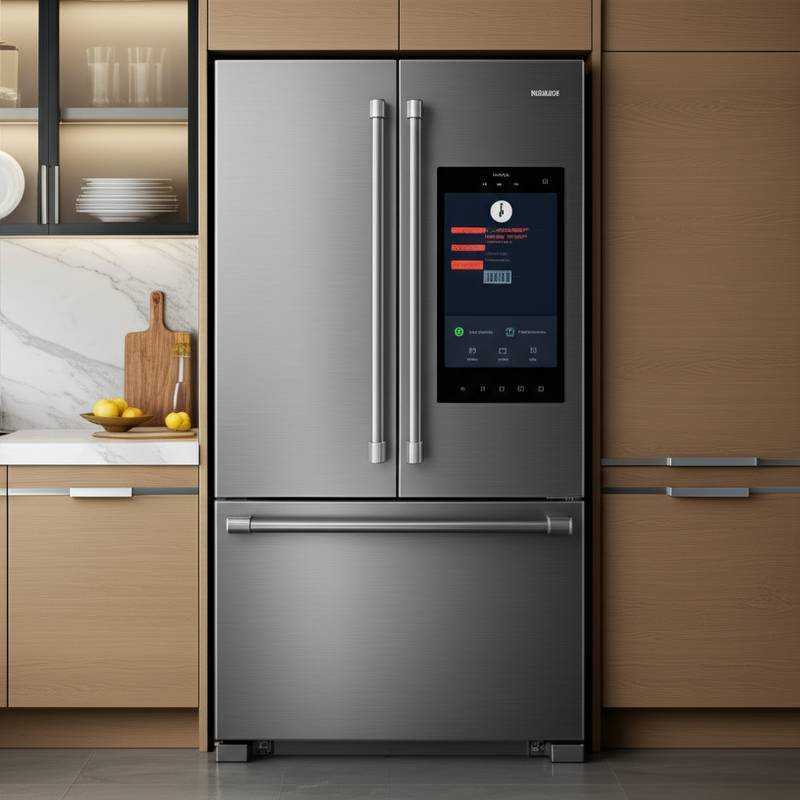Smart Fridges: Instant Food Recall Detection
Smart kitchens advance rapidly, with the refrigerator emerging as a central connected device. Once merely a cooling unit, it now monitors groceries, tracks freshness, and detects recalled products to prevent risks. The newest smart fridges feature instant food recall detection, shifting safety from reactive measures to proactive protection.
This development mirrors broader trends in smart homes, where appliances prioritize user well-being alongside convenience. Homeowners increasingly seek devices that support healthier lifestyles. Food recall detection exemplifies technology's role in delivering reliable security.
The Growing Need for Smarter Food Safety
Food recalls pose persistent risks. Contaminated produce or improperly labeled goods often reach consumers before alerts spread widely. Conventional notifications depend on media reports or websites that receive limited attention. Delays can allow hazardous items to enter diets unnoticed.
Smart refrigerators address these gaps through integrated tools. Barcode scanners capture product details at stocking, while cloud links access live safety records. Inventory systems maintain current logs of stored goods. Upon recall issuance, the fridge matches data against its records and notifies users via screen or mobile app.
Such capabilities build essential trust. Families gain assurance that stored food meets safety standards without constant vigilance.
How Instant Recall Detection Works
Detection starts with inventory creation. Users scan barcodes when placing items inside, or built-in cameras employ AI for visual identification of packaged and fresh goods. The system logs details like expiration dates and batch numbers, updating dynamically as contents change.
A secure connection to centralized food safety databases ensures real-time synchronization. Agencies like the FDA update these repositories promptly. When a recall activates, the fridge scans its inventory for matches based on UPC codes, lot numbers, or descriptions.
Notifications deliver comprehensive details:
- Product name, brand, and batch information
- Recall cause, such as bacterial contamination or allergen absence
- Guidance on disposal, returns, or refunds
- Access to verified agency reports
This automation eliminates manual checks, positioning the fridge as a vigilant health guardian.
The Consumer Value Behind the Technology
The technology's strength lies in its practical impact on daily life. Early detection prevents illness, offering families proactive defense against unseen threats. Users respond swiftly, avoiding health scares that disrupt routines.
Precision targeting reduces unnecessary waste. Households discard only affected items, preserving unaffected stock. This efficiency appeals to budget-conscious shoppers and environmentally aware individuals.
For vulnerable groups like children, elderly users, or those with allergies, the feature provides extra vigilance. It elevates the refrigerator from a passive tool to an active ally in wellness management.
Real-World Examples of Smart Recall Detection
Leading brands incorporate recall features into their smart fridge lines. Samsung's Family Hub series links to USDA databases, syncing alerts for items like ground turkey recalled for salmonella. Users receive on-door notifications with disposal instructions.
LG's InstaView models partner with services like Instacart. Purchase data from app orders triggers matches against recalls, prompting fridge alerts and reorder options. A recent case involved romaine lettuce pulls; the system flagged bagged greens and suggested safe alternatives.
These integrations streamline responses. They demonstrate industry progress toward intuitive, end-to-end safety solutions.
Privacy and Data Confidence
Connected devices raise valid privacy questions. To function, fridges process purchase and storage data. Ethical makers implement robust safeguards, including end-to-end encryption and user-controlled sharing settings.
Opt-in features allow customization, such as limiting data to recall purposes only. Clear policies outline retention periods and third-party access. Surveys indicate that when benefits like instant safety are evident, users prioritize functionality over concerns.
Transparency fosters adoption. Brands that prioritize user control build lasting confidence in smart appliances.
The Role of Artificial Intelligence in Detection
AI enhances accuracy beyond basic scanning. Computer vision algorithms recognize unpackaged items, like spotting recalled berries in a drawer via shape and color analysis. This handles scenarios where barcodes are unavailable.
Machine learning refines performance through patterns. It learns from user corrections, regional recall trends, and shopping habits to minimize false alerts. Over time, the system anticipates needs, such as prioritizing checks for high-risk items like dairy.
These advancements ensure reliable, evolving protection tailored to individual households.
The Broader Impact on Food Supply Transparency
Individual benefits extend to systemic improvements. Anonymized data from connected fridges informs suppliers about recall reach, enabling quicker quarantines. Retailers adjust stocking based on aggregated insights, curbing widespread distribution errors.
This feedback strengthens the supply chain. Faster resolutions cut economic impacts and enhance overall industry accountability. Smart fridges thus contribute to safer food systems at scale.
Barriers to Widespread Adoption
Despite advantages, hurdles remain. Premium pricing deters some buyers, as smart models cost 20 to 50 percent more than basics. Skepticism persists regarding feature reliability in diverse kitchens.
Interoperability issues arise with varying database standards. Not all regions maintain uniform recall data. Manufacturers address this by standardizing protocols and offering firmware updates.
As production scales and prices drop, accessibility will improve. Integration with voice assistants like Alexa further eases entry.
Steps to Integrate Recall Detection in Your Home
Ready to upgrade? Evaluate fridges with robust inventory apps, such as those from Whirlpool or GE. Verify compatibility with major safety databases during purchase.
Complement hardware with software: Use apps like AnyList for purchase logging, which syncs to fridge systems. Regularly update device firmware to access new recall features.
Select brands emphasizing data security. Review user manuals for setup guides that simplify connectivity. This preparation ensures seamless benefits from day one.
Enhancing Everyday Safety Through Smart Innovation
Instant recall detection redefines kitchen reliability. It empowers users with timely insights, reducing risks and simplifying choices. As technology matures, smart fridges promise sustained protection, making homes safer without added effort.
